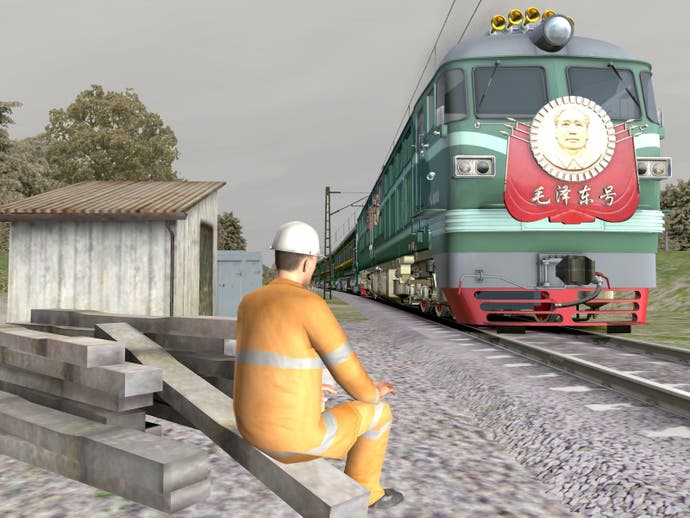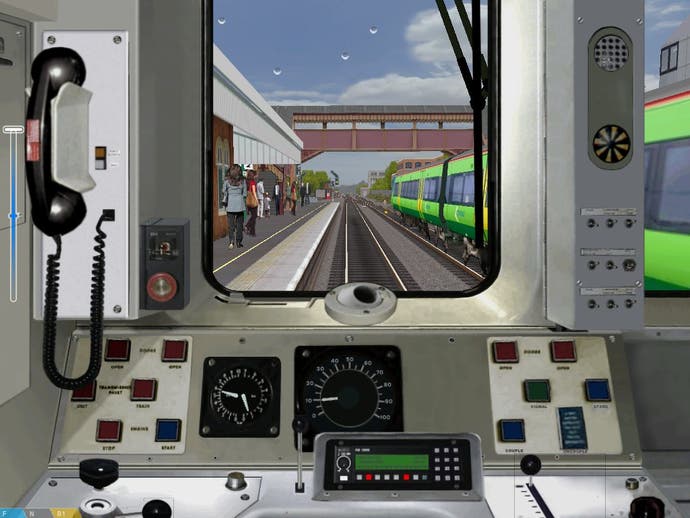Why I Love... Train Simulators
The attraction of traction.
After several years of operating simulated steam trains, I still find myself stalled on the slopes after failing to maintain boiler pressure. Having racked up hundreds of hours in the cab, I still occasionally overshoot platforms or slide past red signals, brakes screaming and teeth gritted.
Driving a train requires as much attention as overseeing a modern aeroplane - sometimes more. There is much to learn, and there are countless times when you complete a scenario and relaunch it immediately, eager to put in a better performance.
Train sims can create stress, but it's their ability to effortlessly dissipate it that I value most. Along with non-violent flight recreations, they offer the perfect way to get the smell of FPS cordite out of your nostrils and wash gobs of RPG viscera from your hair.
In between watching for signals and monitoring dials, there's plenty of time to gaze wistfully at unfurling landscapes, listen to distant church bells and blow your whistle at disappointingly unflappable sheep. Now and again, it's great to beetle through a polygonal landscape which isn't laced with hate or laden with mystery.
When the word 'escapism' is bandied around by ludologists, it's usually in connection with elaborate fantasies - the space opera, the Tolkienesque epic, the post-apocalyptic nightmare. Train simulators prove it's possible to escape by surrounding yourself with the utterly prosaic.

Not only does the Train Sim Express call at Respite Junction, Nostalgia Old Street, and Challenge Central, it also makes regular stops at Fecundity Interchange. One of the marvellous things about the four titles mentioned in this piece is they get richer every single day, thanks to the graft and craft of creative fans.
There's always a new route waiting to be explored, a new locomotive or multiple-unit sitting expectantly in the arrival road. The vast communities huddling at hubs like TrainSim.com and UKTrainSim.com have transformed their chosen sims. They've altered their gauges, taken them to new lands and times and even even adapted them for new purposes. In terms of quality, their work often rivals that of the commercial add-on brigade who are also busy enriching and extending.
So then, tempted to take to the rails? If you've never simmed before, Railworks 2 is an excellent place to start. It's prettier and friendlier than its rivals. There's no demo available but a recent promotional toy from The National Railway Museum will give you an inkling of what to expect.
Surprisingly, considering its age, Microsoft Train Simulator is not all that far behind in the looks department. It may even catch up in the near future thanks to OpenRails, a promising open-source overhaul. If you do plump for MSTS, ten years' worth of community-crafted extras mean you'll almost certainly be able to drive a local line or operate a favourite machine.

Trainz is also backed by a staggering range of free content, but unfortunately much of it is stored at the developer's own shunter-slow download station. In its favour the Aussie offering does provide superb route building facilities and endearingly extensive Thomas tributes.
Far too grown-up for anthropomorphic engines, the free OpenBVE enjoys a deserved reputation for superb cab ambience, authentic instrumentation and credible physics. Those prepared to brave installation bafflement and master complex doze-disturbing safety systems can get a peerless glimpse of what it's like to drive a modern train.
I'm tempted to wind-up this confession, rallying cry and beginner's guide with a brief introduction to the wonderful world of signalling simulations, but I fear any more wilful eccentricity may cause Eurogamer to melt or vomit locusts.
As much as I love train simming, it's not something I could ever evangelise with unfettered enthusiasm. Thrills like cold-starting a Deltic or powering across a rainy Ribblehead Viaduct in a Peppercorn A1-hauled express are conditional. Ignore the anorak symbol at your peril.